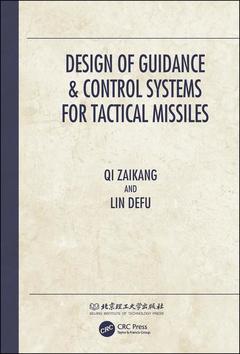Description
Design of Guidance and Control Systems for Tactical Missiles
Authors: Zaikang Qi, Defu Lin
Language: English
Subject for Design of Guidance and Control Systems for Tactical Missiles:
Keywords
Proportional Navigation; Guidance Law; Scale-factor error model; Proportional Navigation; Target Maneuvering Acceleration Estimation; Missile Body; Stabilized platform based seeker; Seeker Stabilization Loop; Real Seeker Model; Pi Compensator; Pitch/Yaw Attitude Autopilot; Guidance Radar Control Loop; Receiver Thermal Noise; Lower Static Stability; Aerodynamic Derivatives; Integrated GNSS Components; Three-loop autopilot; Roll-pitch seeker; Autopilot Design; Trajectory Models; Aerodynamic Transfer Functions as Controlled Plant; Accelerometers; Bode Diagram; Missile Control Methods; Euler Equations of Motion; Control Surface Conventions; Seeker; Miss Distance; missile guidance control systems; Flight Path Angle; seeker system designs; Acceleration Command; autopilot designs; Disturbance Moment; Guidance Loop; Proportional Navigation Guidance Law; Proportional Navigation Guidance; Optimal Guidance Law; Proportional Navigation Law; Guidance Radar; Missile Acceleration; Roll Angular Velocity; Aerodynamic Configuration; Sideslip Angle; Gimbal Angle; Yaw Angular Velocity; Kalman Filter; Guidance Dynamics
· 17.8x25.4 cm · Hardback
Description
/li>Contents
/li>Biography
/li>
Design of Guidance and Control Systems for Tactical Missiles presents a modern, comprehensive study of the latest design methods for tactical missile guidance and control. It analyzes autopilot designs, seeker system designs, guidance laws and theories, and the internal and external disturbances affecting the performance factors of missile guidance control systems. The text combines detailed examination of key theories with practical coverage of methods for advanced missile guidance control systems. It is valuable content for professors and graduate-level students in missile guidance and control, as well as engineers and researchers who work in the area of tactical missile guidance and control.
Zaikang Qi is a Weapon Guidance and Control Technology Chief Technical Expert. He has served as the Chair Professor of Aircraft Guidance and Control Design in Beijing Institute of Technology, Director of the Institute of UAV Autonomous Control. He has been engaged in teaching and researching in the field of aircraft system design for 60 years. In addition, he has worked as Chief Engineer over several advanced researches and model scientific research projects. He is a member of the State Council Academic Degrees Committee Disciplinary Appraisal Team of the People's Republic of China and International Editor of the American Journal of Computers in Mechanical Engineering.
Lin Defu received his Ph.D degree from Beijing Institute of Technology. Currently, he is Director of the Institute of UAV Autonomous Control. He has more than 20 years’ experience in the overall design and guidance and control of flight vehicles. He has worked as principle investigators for several key national projects. Due to his outstanding research work, he has been awarded second prize of National Scientific Invention and National Defense Science and Technology. He has more than 80 journal publications and serves as member of multiple academic committees.
These books may interest you

Modern Missile Guidance 208.65 €



